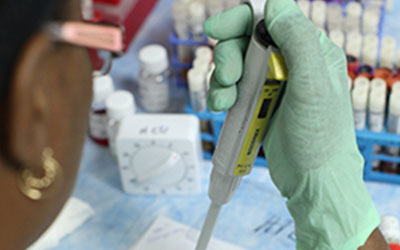Context
The SPHaïtiLAB project is part of the European Union program “Supporting Public Health Institutes”.
Since 2015, the program has provided support to seven other capacity-building projects within institutes or schools of public health around the world (Bangladesh, Burundi, Kenya, Laos, Myanmar, Uganda and Democratic Republic of the Congo), allowing beneficiaries to provide strategic, evidence-based and locally-adapted policy advice to health authorities and stakeholders, as well as training and other decision-making support. The program also helps project teams develop and monitor the implementation of health policies at the national or sub-national level.
Aims
The main objective of the SPHaïtiLAB project is to contribute to improving health in Haiti through analysis and strategic advice on laboratory policy.
The specific objectives are:
- To support the Haitian Ministry of Public Health and Population and the National Public Health Laboratory (LNSP, Laboratoire National de Santé Publique in French) for strategic decision-making based on an evaluation of the existing regulatory framework, an analysis of the local context and key data
- To strengthen the LNSP’s expertise, knowledge and resources
Activities
- Conduct an operational study of the prevalence of multidrug-resistant tuberculosis
- Reinforce 15 medical laboratories in the tuberculosis network
- Assess 30 laboratories and implement the National Laboratory Network’s Five-Year Strategic Plan, 2010-2015
- Provide technical consultations for the development and validation of the Ministry of Public Health and Population’s framework documents for Haiti’s National Health Research Policy, National Laboratory Policy, strategic plan for the national laboratory system 2019-2023, operational plan, training plan and quality plan
- Improve the IT system for laboratory management
- Conduct training and participate in national and international conferences
- Recruit and appoint new staff
- Provide additional personnel for project coordination
Achievements
Exploring TB prevalence in Haiti and ensuring quality diagnosis

A pilot study has been conducted by the GHESKIO Centers, on the prevalence of multidrug-resistant tuberculosis in Haiti involving 3,028 patients in five sites located in the north, center, capital and south of the country. The study began in 2016 and preliminary results were presented in October 2018. Full data analysis is in progress.
The GHESKIO Centers mobile team also conducted training and supervision in 15 laboratories across the country. The training aimed to improve the ability of laboratory technicians to use the GeneXpert system to diagnose tuberculosis and rifampicin-resistant tuberculosis.
A country-wide assessment of medical labs
We conducted a cross-sectoral evaluation of 30 medical laboratories across the country, with three laboratories per department, thanks to a partnership between the National Public Health Laboratory (LNSP), the African Institute of Public Health (IASP) and the Mérieux Foundation. We adopted a standardized approach for the collection and analysis of field data and presented our findings in May 2016.
Preparing the next five-year plan
Also, in collaboration with the LNSP and the IASP, we carried out an assessment in August 2016 of the National Laboratory Network’s Five-Year Strategic Plan, 2010-2015. This work highlighted both strengths and areas for improvement to take into account in drafting and implementing the next Strategic Plan.
The drafting of the National Laboratory System Strategic Plan for 2019-2023 was the subject of two consultative workshops, as well as a significant number of meetings of the smaller working group. The document is currently being finalized.
Drafting a National Laboratory Policy
Moreover, working hand in hand with technical and financial partners, the LNSP used the results of the two assessments carried out as part of the SPHaïtiLAB project to draft Haiti’s National Laboratory Policy. This document was discussed during a workshop and a consultation workshop with the sector’s stakeholders.
The document was validated in 2018 by the Minister of Public Health and Population.
Drafting a National Health Research Policy
The Laboratory Epidemiology and Research Department, in collaboration with its technical and financial partners, was able to carry out two technical consultations on the theme of health research in Haiti and identify the vision and strategies of the Ministry of Health and Population for the development of this sector. The National Health Research Policy is being finalized.
Newcomers enrich the LNSP
Additional staff were hired to join the LNSP: a research coordinator, an officer in charge of the laboratory management IT system, a biosafety/biosecurity officer and a communications officer, all of whom are helping the LNSP develop these different areas of activity.
A Laboratory Management System (LMS) Officer was also hired to work on the implementation of the SoftLab LMS at the LNSP. In addition, a pilot study has begun on the use of the Mérieux Foundation’s free, open source software for peripheral laboratories, LabBook, at the University Peace Hospital.
Staff from the GHESKIO Centers were assigned to and supported by the SPHaïtiLAB project for a pilot study on the prevalence of multidrug-resistant tuberculosis, training and supervision of partner sites. We are in charge of the study’s international coordination.
Strengthening capacities
Between 2015 and 2018, the SPHaitiLAB project facilitated the organization of 32 training sessions with a total of 692 beneficiaries. Training topics were numerous, and ranged from technical training on GeneXpert and biosafety / biosecurity to more general topics such as project management and fundraising.
